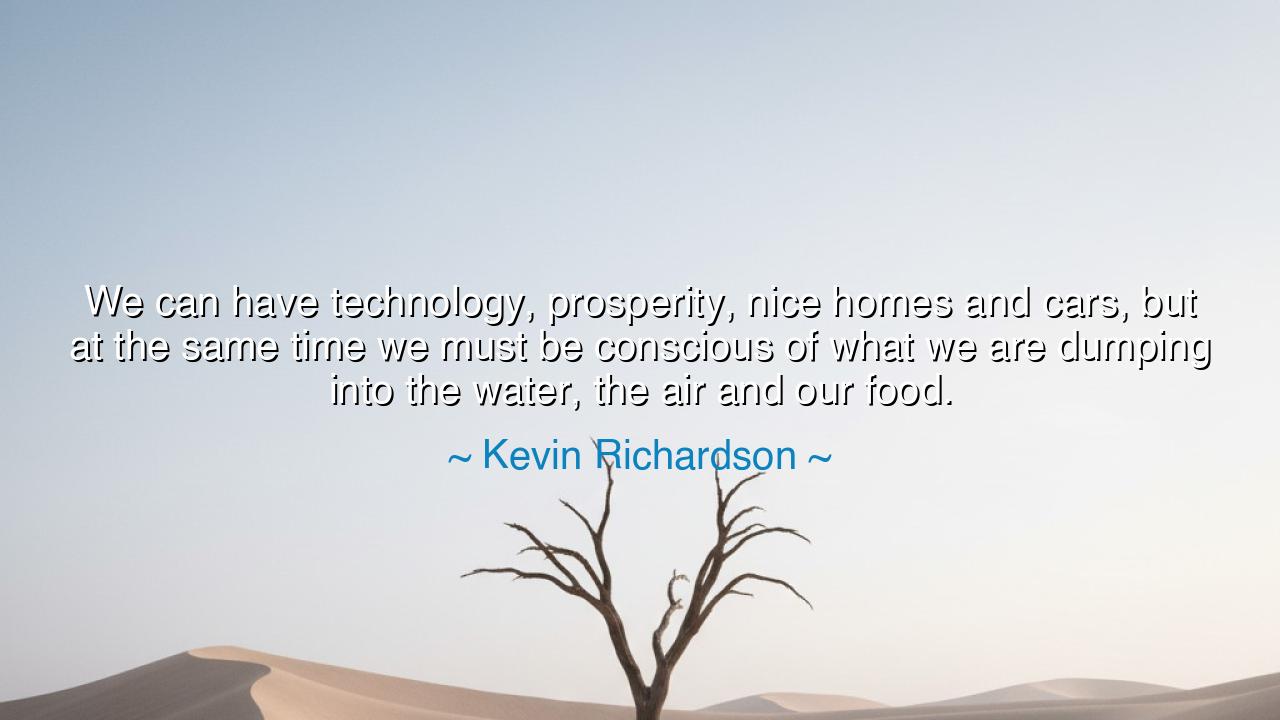
We can have technology, prosperity, nice homes and cars, but at
We can have technology, prosperity, nice homes and cars, but at the same time we must be conscious of what we are dumping into the water, the air and our food.






The words of Kevin Richardson—“We can have technology, prosperity, nice homes and cars, but at the same time we must be conscious of what we are dumping into the water, the air and our food”—speak as a timeless warning, one that would have echoed from the temples of old if the ancients had known our machines. His voice carries the weight of balance: the understanding that progress, though dazzling, becomes hollow when it poisons the very breath of life. It is a call for awareness, for humility before the earth that sustains us, and for gratitude that manifests not only in words but in restraint.
From the dawn of civilization, humankind has wrestled with this duality — the desire to create and the danger of overreaching. When Prometheus stole fire from the gods, he gave humanity the gift of light and the curse of consequence. Fire warmed homes, forged tools, and lit the night — yet it also burned forests and cities when wielded without care. Richardson’s words mirror that myth: our technology and prosperity are the new fires of the modern age, magnificent and perilous. To forget this truth is to invite destruction disguised as comfort.
Look to history, and you will see how civilizations fell when they forgot their covenant with nature. The ancient Mesopotamians once tamed rivers with irrigation, growing vast fields of grain — but they did not heed the salting of the soil, and their cities withered into dust. In more recent times, the once-lush forests of Easter Island vanished under the axes of ambition, leaving only stone faces staring toward the horizon. So too, if we fill our skies with smoke, our oceans with waste, and our food with poison, our monuments of wealth will stand on poisoned ground.
Richardson’s wisdom is born from his bond with the wild — he who walks among lions knows that power without reverence is peril. His awareness of the environment is not the sentiment of luxury, but the discipline of survival. He reminds us that our inventions are not evil, but they demand guardianship. The car that carries us can also choke the air; the factory that feeds us can also poison the stream. In every act of creation lies a shadow, and only consciousness keeps that shadow from consuming the light.
To live by this teaching is to practice the art of sacred balance. One need not renounce all comfort, but one must act with mindfulness — recycle the waste, plant the tree, purify the water, honor the soil. Every small act of care ripples outward like drops in a vast ocean. The ancients built temples of stone; we must build temples of green. For in the purity of the air and the clarity of the water, we glimpse the reflection of our own souls.
Let us remember, then, that prosperity is hollow if the earth sickens beneath it. What good are golden palaces if the rivers run black? What joy is there in progress if our children breathe poison? The wise know that wealth is not measured in possessions but in the purity of the world that endures. To be conscious, as Richardson teaches, is to lift our gaze beyond the moment — to see that every action taken against the earth is an injury to ourselves.
So walk gently, O children of the modern age. Let your technology serve life, not consume it. Let your homes be not fortresses against nature, but extensions of it. For the day will come when the rivers will ask what we have poured into them, and the winds will whisper what we have released. If we live with consciousness, our descendants will inherit not a world of decay, but a garden reborn — where wisdom and progress walk hand in hand beneath the endless sky.






AAdministratorAdministrator
Welcome, honored guests. Please leave a comment, we will respond soon